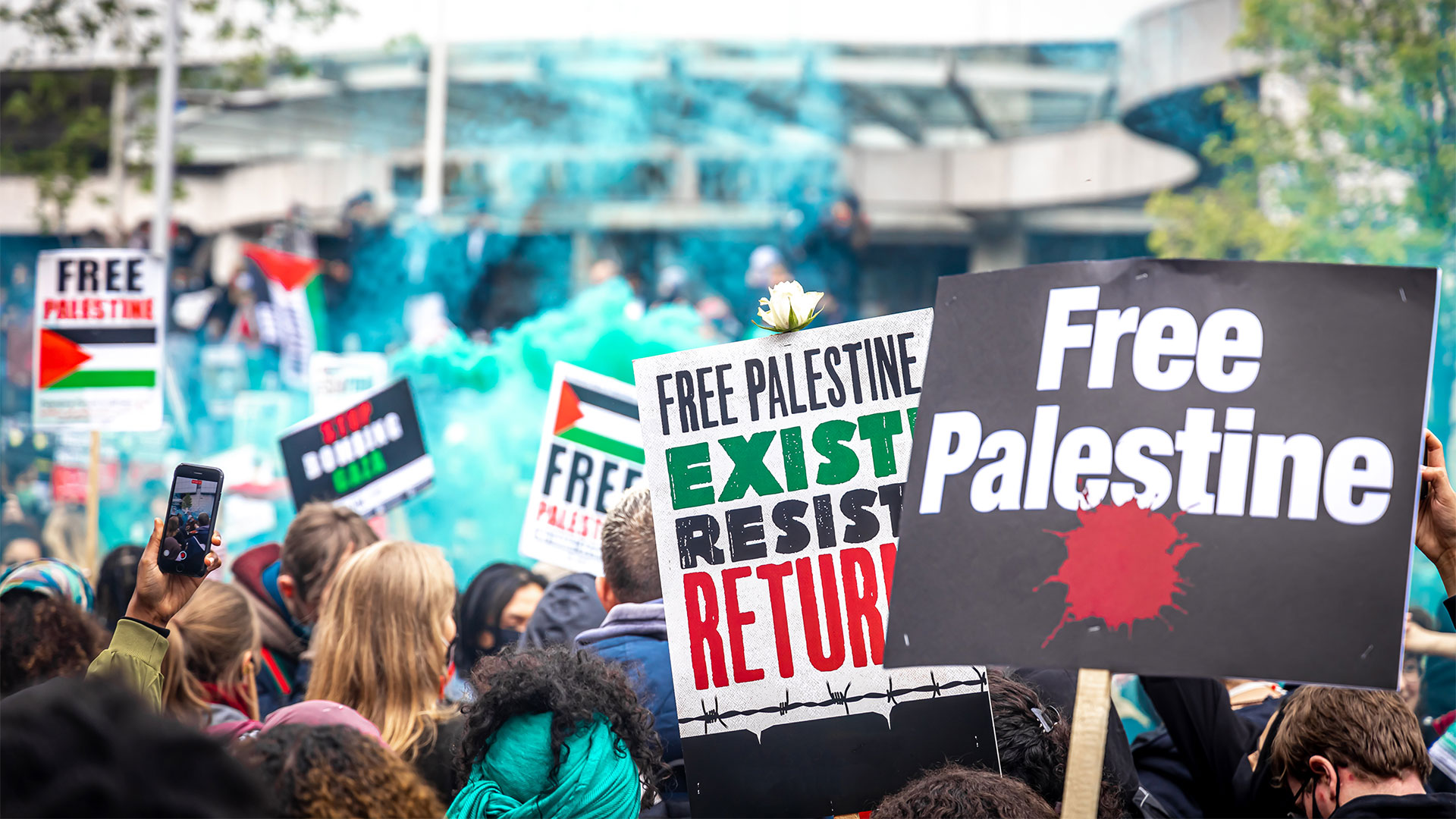Jer-USA-lem
US-Israel Relations in History and Prophecy
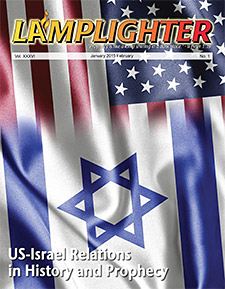
The greatest miracle of the 20th Century was the re-establishment of the state of Israel. It was a fulfillment of Bible prophecy, and the United States played a key role in that fulfillment.
How have we interacted with the state of Israel since that time, and what does the Bible say about our future relationship? Let’s begin by taking a look at the history of our relationship, considering each U.S. Administration since 1948 when the state of Israel came back into being.
Truman
Our relationship with the state of Israel began on the best possible terms in 1948 when President Harry S Truman recognized the state of Israel immediately after David Ben Gurion had read the Declaration of Independence.1
Truman had already shown a heart for the Jewish people in his speeches during World War II when he referred to Hitler as a “mad man” and warned that the “Nazi beasts” were carrying out a “systematic slaughter” of the Jews.2 He favored allowing Jewish refugees into the country during and after World War II. But the Congress balked at his proposal, so after he became President, he issued an executive order called the “Truman Directive,” on December 22, 1945.3 This order opened the door and 23,000 Jewish refugees came in during the next two years.
Truman continued to pressure the Congress, and in 1948 he finally got legislation that permitted 80,000 Jewish refugees to enter the country.4
Truman’s swift action on May 14, 1948 made the United States the first nation to recognize the state of Israel — and our recognition gave legitimacy to the state in the eyes of the world.5
Truman took this action because he was a student of the Bible, and he believed the Jewish people had a right to the land.6 Amazingly, he took the action despite the fact that almost every person in his administration opposed it. The opponents included the Secretary of Defense, James Forrestal, and the Secretary of State, George Marshall, both of whom strongly opposed recognition.
In fact, one of the only persons in the Truman Administration who encouraged recognition was the president’s personal legal counsel, Clark Clifford, who cited verses from Deuteronomy to verify the Jewish claim to the land. Clifford also believed that recognition would be an “act of humanity” in response to the Holocaust.7
Truman later referred to his decision as “one of the proudest moments of my life.”8
But despite the crucial support Truman gave, he instituted an arms embargo on Israel in the naive hope that it would prevent violence in the Middle East.9
Eisenhower
Dwight Eisenhower always supported Israel in words, but behind the scenes, he applied great pressure for Israel to withdraw from the Sinai Peninsula after the Suez War ended in 1956.10
In fact, he became the first president to threaten Israel when the Israelis dragged their feet about withdrawing. He told them either to withdraw or else he would withhold more than $100 million in U.S. aid. He also supported a UN resolution condemning Israel for not withdrawing.11
These actions in defiance of our allies — Britain, France and Israel — brought accolades from the international community at the United Nations, especially from the Arab and Muslim states.
It is interesting to note that in 1965, while being interviewed by a biographer, Eisenhower “wistfully commented” that “looking back at Suez, I regret what I did. I never should have pressured Israel to evacuate the Sinai.”12 President Nixon later reported that Eisenhower had told him the same thing.13
One other thing Eisenhower did was to continue the arms embargo that had been initiated by President Truman.
Kennedy
President John F. Kennedy was a strong supporter of Israel in both word and deed. He called Israel “the child of hope and the home of the brave.”14 He added: “Israel carries the shield of democracy and it honors the sword of freedom.”15
He lifted the arms embargo and extended the first informal security guarantees to Israel in 1962. And beginning in 1963, he authorized the sale to Israel of advanced U.S. weaponry, including surface-to-air Hawk missiles.16
But he firmly opposed Israel’s development of nuclear weapons. In a letter to Prime Minister David Ben Gurion, dated May 18, 1963, he insisted that American inspectors be allowed to visit the Dimona nuclear reactor located in the Negev desert. He warned against using the reactor to develop nuclear weapons. Prophetically, he wrote, “Development of a nuclear weapons capability by Israel would almost certainly lead other larger countries that have so far refrained from such development to feel that they must follow suit.”17 Kennedy’s plea was ignored by the Israelis.
The President’s brother, Bobby, was also a strong supporter of Israel. During his 1968 campaign for the Democrat nomination for President, Bobby declared at a Los Angeles synagogue that he would maintain “clear and compelling support for Israel.” His assassin, a Palestinian named Sirhan Sirhan, later said these words drove him to shoot the candidate.18
Johnson
Lyndon Johnson quickly emerged as one of the greatest friends of Israel among modern day presidents — so much so that he has often been referred to as “America’s first Jewish President.”19 Soon after taking office in the aftermath of John F. Kennedy’s assassination in 1963, Johnson told an Israeli diplomat, “You have lost a very great friend, but you have found a better one.”20 During his administration, the U.S. became Israel’s chief diplomatic ally and primary arms supplier.
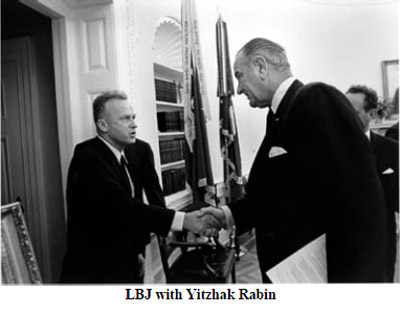
Long before he became President, Johnson had established himself as a friend of the Jewish people. In 1938, when he was a Congressman, he worked covertly to establish a refuge in Texas for European Jews fleeing Nazi Germany. In the process, he helped hundreds of European Jews enter Texas through Cuba, Mexico and South America.21
In part, Johnson was influenced in his attitude towards the Jews by the religious beliefs of his family, especially his grandfather (Samuel Ealy Johnson, Sr.). He once reported that his grandfather had said to him, “Take care of the Jews, God’s Chosen People. Consider them your friends and help them any way you can.”22
Johnson was further influenced by a visit he made to the Dachau death camp in June of 1945. His wife, Lady Bird, later recalled that when her husband came home, “he was still shaken, stunned, terrorized and bursting with an overpowering revulsion and incredulous horror at what he had seen.”23
Johnson strongly supported Israel during the 1967 Six Day War, approving the sale of tanks and fighter jets.24
When asked by Soviet premier, Alexei Kosygin, why the U.S. supported Israel when there were 80 million Arabs and only 3 million Israelis, Johnson replied, “Because it is the right thing to do.”25
LBJ also closely supervised the crafting of UN Resolution 242 in 1967 which called for Israel to be guaranteed “secure and recognized boundaries.”26
Nixon
President Nixon is considered today to have been anti-Semitic, based upon ugly statements he made about the Jews that are contained on the infamous White House tapes. But when it came to Israel, he was a realist in foreign policy who recognized the importance of the only democratic state in the Middle East.
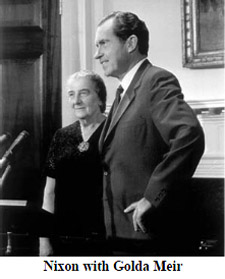
And when Israel suffered a surprise invasion in the 1973 Yom Kippur War, Nixon responded immediately with overwhelming aid to counter the offensive.27 He did so despite the fact that he knew it would alienate the Arab World and greatly endanger our relationship with the Soviet Union.
In short order, the U.S. supplied $2.2 billion worth of aid that totaled 22,000 tons of equipment that was transported to Israel in 566 round-the-clock flights. Another 90,000 tons arrived by sea.28
To this day, Nixon is greatly admired by the Israelis “as the man who saved Israel.”29
Golda Meir, who was the Israeli Prime Minister during the war, wrote her sister a letter in which she said: “Look, Clara, you’re an American. You don’t like Nixon. I’m an Israeli. I’ll never forget that if it hadn’t been for Nixon, we would have been destroyed.”30
Ford
During his short three year tenure in the presidency (1974-77), President Ford took a hard line stance toward Israel, demanding that they withdraw from the Sinai which they had reconquered during the Yom Kippur War.
Ford’s letter to Prime Minister Yitzhak Rabin was so threatening, that it prompted a response from 76 Senators in which they called on the President to “make it clear that the United States, acting in its own national interests, stands firm with Israel.”31
Nonetheless, when the Israelis continued to stall in response to his demands, Ford put the brakes on an Israeli request for F-15 fighter planes and froze all scheduled deliveries of arms.32
Carter
President Carter put the Sinai issue on the front burner when he assumed the presidency, and in 1979 he was able to broker a deal between Israel and Egypt which provided for a complete withdrawal of Israel from the Sinai Peninsula.33 “Not since Theodore Roosevelt’s efforts to end the Russo-Japanese War in 1905 had a president so effectively mediated a dispute between two other nations.”34
Unfortunately, in recent years, Carter’s writings have revealed that he is a vehement anti-Semite who detests the Israelis.35 And thus when the 2014 war between Israel and Hamas broke out, Carter denounced Israel and called for the international recognition of Hamas.36
Reagan
Ronald Reagan has the reputation of being the most pro-Israel president in American history. Much of that reputation is based on glowing words that he often spoke in support of Israel. For example, in September 1982 in a foreign policy speech about the Middle East he said:37
Israel exists and it has a right to exist in peace behind secure and defensible borders. And it has the right to demand of its neighbors that they recognize those facts. I have personally followed and supported Israel’s heroic struggle for survival ever since the founding of the state of Israel. In the pre-1967 borders, Israel was barely 10 miles wide at its narrowest point. The bulk of Israel’s population lived within artillery range of hostile Arab armies. I am not about to ask Israel to live that way again.
But despite words like these, Reagan had a number of runins with Israel.38 For example, in 1981 he significantly strengthened the Arabs by selling them some of our most sophisticated weapons. He did this despite great opposition by both the Israelis and the Israeli lobby in the Congress.39 And when the Israelis bombed the Iraqi nuclear reactor in 1981, Reagan supported the UN Security Council resolution that condemned Israel.40 On the other hand, in 1985 Reagan began to provide Israel with $3 billion in foreign aid annually, all in the form of grants.41
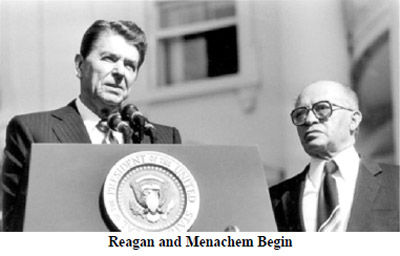
When Israel launched the war in Lebanon in 1982 to clear the PLO out of the country, Reagan initially supported it, but he soon soured on the operation. He pressured the Israelis to end it, and he helped arrange for Arafat and the PLO leadership to escape into exile in Tunisia.42
More significantly, in 1988 Reagan authorized the State Department to enter into dialogue with the PLO, reversing the U.S. policy of refusing to recognize terrorist organizations.43
Reagan and Menachem Begin had a particularly rough relationship. Reagan was infuriated when he was not informed in advance of the Israeli attack on the Iraqi nuclear reactor in 1981, and that same year chastised Israel for annexing the Golan Heights. In response, Begin accused Reagan of treating Israel like a “banana republic.”44
George H. W. Bush
The First Bush presidency proved to be the decisive turning point in US-Israel relations. Bush came to power in 1989, and he had hardly assumed office before his anti-Semitic Secretary of State, James Baker, proclaimed that the time had come for Israel to “abandon its expansionist policies.”45
Bush added fuel to the fire when he announced in 1991 that he considered East Jerusalem to be “occupied territory,” despite the fact that Israel had officially annexed it in 1980.46
Following the Gulf War in 1991, President Bush decided to pursue an Arab-Israeli settlement by convening an international conference in Madrid, Spain. He forced the Israelis to attend by making their participation a condition for the U.S. to provide $10 billion in loan guarantees to the World Bank. Israel needed the money to deal with an overwhelming influx of immigrants from the Soviet Union.47
This conference laid the groundwork for the Oslo Accords in 1993 which initiated the Land-for-Peace process whereby Israel would surrender land in exchange for promises of peace.
I think it is interesting to note that after James Baker completed his service as Secretary of State in 1992, one of the first things he did was to establish a think tank at Rice University called the Baker Institute for Public Policy. And who did he honor with a speaking invitation? Yasser Arafat. To me, it was like inviting Hitler to speak.48
Clinton
President Clinton positioned himself as a strong friend of the Jewish people and the nation of Israel. Never before in history did Jewish Americans play such a significant role in a presidential administration. Clinton had five Jews in his Cabinet, he appointed two Jews to the Supreme Court, and many other Jews served in key positions.49

Clinton provided Israel with substantial financial aid, but he worked constantly behind the scenes to convince Israel to trade land-for-peace.
He presided over the signing of the Oslo Accords at the White House in September of 1993. It was these agreements that launched the land-for-peace concept, starting with the Israeli withdrawal from Jericho.50
In 1998 Clinton hosted the Wye River Conference between Arafat and Netanyahu which resulted in Israel agreeing to withdraw from the ancient Jewish city of Hebron.51
And in 2000 Clinton convened the Camp David Conference between Arafat and Israeli Prime Minister Ehud Barak — the most liberal prime minister in Israel’s history. Barak agreed to give Arafat all that he had ever demanded in diplomatic circles, and to the astonishment of all present, Arafat responded by getting up and walking out of the room. He immediately flew back to Israel and launched the Second Intifada.52
George W. Bush
The second Bush came to power by confirming to Israel’s Prime Minister, Ariel Sharon, that he was not going to follow his father’s hard-line policy toward Israel.53 But hardly had he given this assurance, when in 2001 he turned around and called for the establishment of a Palestinian State, the first American president to do so publicly and formally, proceeding to make it an official part of U.S. foreign policy.54
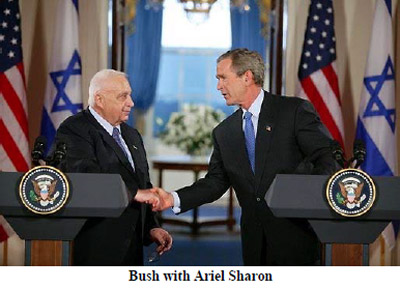
The Bush Administration tried to put out the firestorm this announcement produced by claiming that President Clinton had endorsed the same policy. It was true that in 2001, two weeks before leaving office, President Clinton had stated that he personally believed that the Middle East conflict could not be resolved without creating “a sovereign, viable Palestinian state.”55 But he had not made that objective a formal goal of U.S. policy. George Bush did.
Bush also gave new impetus to the Land for Peace strategy by demanding that Israel surrender the Gaza Strip. And in the midst of the withdrawal in the summer of 2005, Bush’s Secretary of State, Condoleezza Rice, proclaimed: “Everyone empathizes with what the Israelis are doing, but it cannot be Gaza only.”56
Obama
President Obama emerged quickly as the most anti-Israel president in U.S. history. His very first television interview was granted shortly after his inauguration to the Muslim network, Al Arabiya.57
He followed this up by dashing off to Egypt in June of 2009 to Cairo to give his famous apology speech to the Muslim nations of the Middle East.58 In that speech he started developing one of his major lines of thought concerning Israel — namely, that the experience of the Jews in the Holocaust is the moral equivalent of what the Palestinians are experiencing under Israeli “occupation.”
A month later, in July 2009, Obama announced that the time had come for “daylight” between the United States and Israel.59
In March of 2010, Obama met with Prime Minister Netanyahu at the White House. The Israeli prime minister was ushered in a side door like a secret mistress and treated with disdain. No press or photos were allowed.60
Obama demanded Israel’s withdrawal from Jewish settlements, and when Netanyahu balked, the president said it was time for him to eat with his family — at which point he walked out and left the prime minister and his aides alone, offering them no food or drink.
In May of 2011 the president went on national TV to demand that Israel return to the suicidal borders that existed before the Six Day War in 1967.61
In March of 2014, the spokesperson for the State Department, Jen Psaki, announced that the Obama Administration no longer considered it necessary for the Palestinians to recognize the existence of the State of Israel!62
Throughout his administration, Obama has continued to condemn Israel’s settlements as being “illegitimate,”63 and he has continued to provide the Palestinian Authority with over $600 million in aid each year.64
But then what more could we expect from a President who proclaimed to the United Nations in a speech delivered in September of 2012: “The future must not belong to those who slander the prophet of Islam.”65
Summary
As you can see, the record of U.S. relations with Israel has been erratic from the start.
Even President Truman, who offered immediate recognition, decided to slap an arms embargo on the fledgling nation.
Since that time, we have often treated the Jewish nation with disdain, forcing its leaders to do whatever we desired through the manipulation of foreign aid and through threats of one kind or another.
And, the Israeli government has had little choice but to conform to our demands. That’s because the stark reality is that our veto in the UN Security Council is the only thing that prevents the world from placing draconian sanctions on Israel that would destroy the nation’s economy in short order.
Overall, I would say that until Obama, the Democrat Presidents have been much more favorable to Israel than have the Republicans.
Recent Years
In recent years, since the early 1990s, we have become increasingly hostile to Israel as we have literally forced them to take the self-defeating path of appeasement. Additionally, year after year, we have insulted the people of Israel by refusing to recognize Jerusalem as their capital.
Think for a moment about what an incredible insult this is to the Jewish people. It is equivalent to the Israelis declaring that they do not recognize Washington, DC as our capital, and then proceeding to place their Embassy in Chicago.
Yet, despite our checkered record of support, we have been Israel’s best friend. They have been the largest cumulative recipient of U.S. foreign assistance since World War II. To date, the United States has provided Israel with $121 billion in aid, almost all of it in the form of military assistance.66
The Future
But the handwriting is on the wall. The days of American support are numbered. The time has come for the Israeli leadership to face up to the fact that its hope and trust needs to be placed in Almighty God and not in the United States.
In like manner, the time has come for our nation to realize that in our manhandling of Israel, we are courting the wrath of God.
Biblical Insights
Let’s conclude by taking a look at what the Bible has to say about all the pressure that is being applied to Israel by the United States and the rest of the world.
Of course, the most important verses are to be found in Genesis 12:1-3 where God told Abraham that He would bless his decendents through Isaac and that He would bless those who bless the Jews and curse those who curse the Jews.
And history attests to the fact that God has been faithful to that promise. Throughout history, the nations and empires who have persecuted the Jews have ended up in the dust bin of history.
The prophet Zechariah said that in the end times the nations of the world would continue to ignore God’s warning about mistreating the Jews. He prophesied that all the nations of the world — all — would come against Israel over the issue of the control of Jerusalem (Zechariah 12:2-3):
2) Behold, I am going to make Jerusalem a cup that causes reeling to all the peoples around; and when the siege is against Jerusalem, it will also be against Judah.
3) It will come about in that day that I will make Jerusalem a heavy stone for all the peoples; all who lift it will be severely injured. And all the nations of the earth will be gathered against it.
And the prophet Joel warned that those who get involved in this process of pressuring Israel to divide up its land will experience the wrath of God (Joel 3:1-2):
1) For behold, in those days and at that time, when I restore the fortunes of Judah and Jerusalem,
2) I will gather all the nations and bring them down to the valley of Jehoshaphat. Then I will enter into judgment with them there on behalf of My people and My inheritance, Israel, whom they have scattered among the nations; and they have divided up My land.
The Folly of Appeasement
History proves conclusively that a policy of appeasement never works because all it does is whet the appetite of the aggressor. Winston Churchill put it this way: “An appeaser is one who feeds a crocodile, hoping it will eat him last.”67
Both the world’s political leaders and the Humanistic leaders of Israel are deceived into believing that the Arab-Israeli crisis is a political one that can be solved with political compromise. But the fact of the matter is that it is not a political crisis — it is a spiritual one that is immune to political settlement.
Satan’s Goal
It is fueled by Satan’s maniacal hatred of the Jewish people. He hates them because:
1) Through them God gave the world His Word.
2) Through them God provided the world’s Savior.
Satan also hates them because God chose them as His witnesses to the world and has promised to bring a great remnant of them to salvation through faith in their Messiah.
Satan wants to prevent God from fulfilling that promise, and so he is determined to kill every Jew on planet earth. He has tried it once before through Hitler. He is preparing to try again through the Antichrist.
But Satan will fail, for God has decreed that a great remnant of His Chosen People will be saved and will serve as the nucleus of a Jewish population that will become the prime nation of the world during the Millennium.
Conclusion
True peace is coming to Israel — but not through peace treaties negotiated by men. It will be achieved when the Prince of Peace breaks from the heavens and arrives on the Mount of Olives, and the Jewish people will cry out: “Baruch Haba B’Shem Adonai!” (Matthew 23:39).
Meanwhile we need to pray for our nation, because our leaders are literally crying out for the wrath of God to fall upon us as we try to force the Israelis to divide their capital city and surrender their heartland.
Psalm 122:6 commands us to “Pray for the peace of Jerusalem.” Since peace will not come to Jerusalem until the Prince of Peace returns, that prayer is really a prayer for the return of Jesus. So pray it fervently, and in the meantime, get up every morning, look at the sky and cry out: “Maranatha! Maranatha! Maranatha! Come quickly, Lord Jesus!”
Notes
1) For detailed information about President Truman’s recognition of Israel, see “Israel’s 60th Anniversary,” by Dr. David R. Reagan, Lamplighter magazine, March-April 2008, pages 3-9.
2) David McCullough, Truman (New York: Simon & Schuster, 1992), page 286.
3) Jewish Virtual Library, “Harry Truman Administration: Statement and Directive on Displaced Persons,” www.jewishvirtuallibrary.org/jsource/Holocaust/truman_on_dps.html.
4) United States Holocaust Memorial Museum, “United States Policy Toward Jewish Refugees, 1941-1952,” www.ushmm.org/wlc/en/article.php?ModuleId=10007094, page 2.
5) Harry S. Truman Library and Museum, “The Recognition of the State of Israel,” www.trumanlibrary.
6) Dr. David R. Reagan, “Israel’s 60th Anniversary,” page 8.
7) Richard Holbrooke, “Washington’s Battle Over Israel’s Birth,” The Washington Post, May 7, 2008.
8) Michael T. Benson, “Truman’s Actions Speak Much Louder Than His Words,” www.snow.edu/publicr/speeches/truman1.html.
9) Shlomo Slonim, “The 1948 American Embargo on Arms to Israel,” Political Science Quarterly, Vol. 94, No. 3, Autumn, 1979, pages 495ff.
10) Jewish Virtual Library, “The Sinai-Suez Campaign: President Eisenhower & PM Ben-Gurion on Israeli Withdrawal from Sinai,” www.jewishvirtuallibrary.org/jsource/US-Israel/phantom.html.
11) Donald Neff, “How Eisenhower Forced Israel to End Occupation After Sinai Crisis: When an American President Said No to Israel,” Institute for Historical Review, www.ihr.org/jhr/v16/v16n2p14_Neff.html, page 2.
12) Israel Resource Review: Behind the News in Israel, “Eisenhower Regretted That He Pushed For Sinai Withdrawal,” http://israelbehindthenews.com/eisenhower-regretted-that-he-pushed-forsinai-withdrawal/2804/.
13) Ibid.
14) John F. Kennedy, “Speech by Senator John F. Kennedy, Zionists of America Convention, Statler Hilton Hotel, New York, NY, August 26, 1960,” www.presidency.ucsb.edu/ws/?pid=74217.
15) Ibid.
16) Stephen M. Walt, The Origins of Alliances, (Ithaca, NY: Cornell University Press, 1987) pp. 95-96.
17) Jewish Virtual Library, “John F. Kennedy Administration: Letter to Israeli PM Ben-Gurion Regarding Visit to Dimona,” www.jewishvirtuallibrary.org/jsource/US-Israel/FRUS5_18_63.html.
18) Stephen Kinzer, “Shot heard round the world: It is now clear that Robert Kennedy’s assassination 40 years ago was in fact an eminently political act,” www.theguardian.com/commentisfree/2008/jun/13/israelandthepalestinians.usa.
19) Lenny Ben-David, “Our First Jewish President Lyndon Johnson?” http://5tjt.com/our-first-jewish-president-lyndon- johnsonan-update.
20) Donald Neff, “Lyndon Johnson Was First to Align U.S. Policy With Israel’s Policies,” http://www.wrmea.org/1996-novemberdecember/middle-east-history-it-happened-in-november.html, page 1.
21) Lenny Ben-David, “Our First Jewish President Lyndon Johnson?” pages 2-3.
22) Jason Maoz, “Lyndon Johnson, Friend of the Jews,” Commentary magazine, August 22, 2008, www.commentarymagazine.com/2008/08/22/lyndon-johnson-friend-of-the-jews, page 2. Much of the information about Johnson’s pro-Jewish activity in his early years has been gleaned by scholars from an unpublished 1989 doctoral dissertation at the University of Texas by Louis Gomolak entitled, “Prologue: LBJ’s Foreign Affairs Background, 1908 – 1948.”
23) Lenny Ben-David, “Our First Jewish President Lyndon Johnson?” page 2.
24) Ibid.
25) Ibid., page 3.
27) Jim Byron, “How Richard Nixon Saved Israel,” http://blog.nixon foundation.org/2010/10/how-richard-nixon-saved-israel, page 1.
28) Mitchell Bard, “Arab-Israeli Conflict #5 – Yom Kippur War,” www.aish.com/jw/me/48893552.html, page 4.
29) Roger Stone, “How Nixon Saved the State of Israel,” www.lewrockwell.com/2014/08/roger-stone/nixon-on-jews-and-israel.
30) Jerry Klinger, “Richard Nixon – Henry Kissinger: The Anti- Semite Who Saved Israel,” http://www.jewishmag.com/167mag/kissinger-nixon-war-watergate/kissinger-nixon-war-watergate.htm, page 16.
31) Haartz, “Gerald Ford, the U.S. president who reassessed policy toward Israel, dies at 93,” December 28, 2006, page 2.
32) Christa Case Bryant, “Netanyahu-Obama tensions nothing new: 5 low points in US-Israel ties,” Christian Science Monitor, September 27, 2012, http://www.unitedjerusalem.org/ ndex2.aspid=1612216&Date=10/17/2012, page 2.
33) Bernard Gwertzman, “Egypt and Israel Sign Formal Treaty, Ending a State of War After 30 Years; Sadat and Begin Praise Carter’s Role,” The New York Times, March 26, 1979.
34) The Miller Center of the University of Virginia, “American President: Jimmy Carter,” http://millercenter.org/president/carter/essays/biography/5, page 3.
35) Jimmy Carter, Palestine: Peace Not Apartheid (New York, NY: Simon & Schuster, 2006).
36) Jennifer Pompi, “Jimmy Carter slams Israel in pro-Palestine op-ed,” The Washington Times, August 5, 2014, http://www.washingtontimes.com/news/2014/aug/5/jimmy-carter-slamsisrael-in-pro-palestine-op-ed.
37) Jewish Virtual Library, “The Reagan Plan,” www.jewishvirtuallibrary.org/jsource/Peace/reaganplan.html, page 3.
38) Chemi Shalev, “If Obama treated Israel like Reagan did, he’d be impeached,” Haaretz, December 9, 2011, http://www.haaretz.com/blogs/west-of-eden/if-obama-treated-israel-like-reagandid-he-d-be-impeached-1.400542.
39) Mitchell Bard, “Reagan’s Legacy on Israel,” www.mitchellbard.com/articles/reagan.html, page 1.
40) Ibid., page 1.
41) Ibid.
42) U.S. Department of State, Office of the Historian, “The Reagan Administration and Lebanon, 1981–1984,” https://history.state.gov/milestones/1981-1988/lebanon, page 2.
43) Mitchell Bard, “Reagan’s Legacy on Israel,” page 2.
44) John E. Lang, editor, Israeli-United States Relationship (Nova Science Publishers Inc (Hauppauge, NYJune 30, 2006), page 25.
45) Foundation for Middle East Peace, “U.S. Policy on Jerusalem,” www.fmep.org/reports/special-reports/special-report-jerusalem/u.s.-policy-on-jerusalem.
46) U.S. Department of State, Office of the Historian, “The Madrid Conference, 1991,” http://history.state.gov/milestones/1989-1992madrid-conference, page 2.
47) Sheryl Gay Stolberg, “Bush and Israel: Unlike his Father,” www.nytimes.com/2006/08/02/world/americas/02iht-bush.2363483.html?page wanted=all&_r=0, page 1.
48) Rice University’s Baker Institute for Public Policy, “Shell Distinguished Lecture Series — Yasser Arafat, President of the Palestine National Authority ,” March 5, 1997, video of speech, http://bakerinstitute.org/events/1245.
49) Jewish Virtual Library, “William ‘Bill’ Clinton.” www.jewishvirtuallibrary.org/jsource/biography/billclinton.html.
50) Gale Student Resources in Contest, 2011, “Bill Clinton’s role in Israeli-Palestinian Peace Accords,” http://ic.galegroup.com/ic/suic/ReferenceDetailsPage, page 2.
51) Time magazine, “Sixteen Years of Israeli-Palestinian Summits: Wye River Summit,” http://content.time.com/time/specials/2007/article/0,28804,1644149_1644147_1644132,00.html.
52) Jewish Virtual Library, “2000 Camp David Summit: Background & Overview” by David Shyovitz, www.jewishvirtuallibrary.org/jsource/Peace/cd2000art.html.
53) Sheryl Gay Stolberg, “Bush and Israel: Unlike his father,” www.nytimes.com/2006/08/02/world/americas/02iht-bush.2363483.html?page wanted=all&_r=0, page 1.
54) The White House, “President Bush’s Freedom Agenda Helped Protect The American People,” http://georgewbush-whitehouse.archives.gov/infocus /bushrecord/factsheets/freedomagenda.html, page 1.
55) Jewish Virtual Library, “Bill Clinton Administration: Speech Outlining the ‘Clinton Peace Parameters’ (January 7, 2001),” www.jewishvirtual library.org/jsource/Peace/clintplan.html.
56) Joel Brinkley and Steven R. Weisman, “Rice Urges Israel and Palestinians to Sustain Momentum,” www.nytimes.com/2005/08/18/interna tional/middleeast/18rice.html, page 1.
57) Al Arabiya News, “Obama tells Al Arabiya peace talks should resume,” www.alarabiya.net/articles/2009/01/27/65087.html.
58) The White House, “Remarks by the President on a New Beginning, Cairo University, June 4, 2009,” www.whitehouse.gov/the_press_office/remarks-by-the-President-at-Cairo-University-6-04-09.
59) Seth Mandel, “Contentions On Israel, Obama Discovers the Obvious,” Commentary magazine, November 21, 2012, www.commentarymagazine.com/2012/11/21/on-israel-obama-discovers-the-obvious.
60) Michael Reagan, “Israeli Prime Minister Mistreated by Obama,” Patriot Update, May 19,2011, http://patriotupdate.com/articles/israeli-prime-minister-mistreated-by-obama.
61) Tom Cohen, “Obama calls for Israel’s return to pre-1967 borders,” CNN, May 19, 2011, www.cnn.com/2011/POLITICS/05/19/obama.israel.palestinians.
62) Breitbart, “State Dept.: Palestinians Do Not Need to Recognize Israel as Jewish State,” by Joel B. Pollak, www.breitbart.com/Big-Peace/2014/03/09/State-Dept-Palestinians-Do-Not-Need-to-Recognize-Israel-as-Jewish-State.
63) Ynet News, “Obama says settlement building illegitimate,” September 23, 2009, www.ynetnews.com/articles/0,7340,L-3781005,00.html.
64) Congressional Research Service, “U.S. Foreign Aid to the Palestinians,” by Jim Zanotti, September 30, 2013, Summary page (no page number), www.fas.org/sgp/crs/mideast/RS22967.pdf.
65) The White House, Office of the Press Secretary, “Remarks by the President to the UN General Assembly.” September 25, 2012, www.whitehouse.gov/the-press-office/2012/09/25/remarks-president-un-general-assembly, page 5.
66) Congressional Research Service, “U.S. Aid to Israel,” by Jeremy M. Sharp, April 11, 2014, summary page (no page number), http://fas.org/sgp/crs/mideast/RL33222.pdf.
67) BrainyQuote, Winston Churchill, http://www.brainyquote.com/quotes/quotes/w/winstonchu100130.html.


